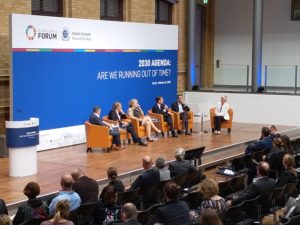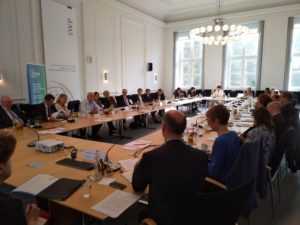
The secretariat of SDSN Germany participated in the Global Goals Forum on 10 October 2019 in Berlin by conducting the Workshop ‘Science and the SDGs’. The Global Goals Forum was organised under the headline ‘2030 Agenda: are we running out of time?’ by the macondo foundation and the German Global Compact Network (DGCN) in order to take stock of the progress being made since the adoption of the 2030 Agenda and to point out the need for action to achieve the Sustainable Development Goals (SDGs) given the fact that there are only 10 years remaining.
During the workshop of SDSN Germany, representatives of HOCH-N (Sustainability at Universities), econsense, Scientists for Future and Principles for Responsible Management Education (PRME) explored the role science can play in achieving the SDGs and how science can best position itself in that regard. This interface topic was discussed in keynote speeches and parallel round-table discussions.

On 14 October 2019, the 10th Extended Leadership Council of SDSN Germany took place under the leadership of Gesine Schwan (Co-Chair of SDSN Germany) at the Stiftung für Wissenschaft und Politik (SWP) in Berlin. For SWP, Marianne Beisheim introduced the topic of the meeting and reported on her impressions of the SDG summit. During the meeting, Peter Becker (SWP), Udo Bullmann (MdEP), Christine Hackenesch (DIE), Andreas Lenz (PBNE), Eefje Schmid (EIB) and Guido Schmidt-Traub (SDSN) discussed in depth the question of ‚German European policy for the SDGs?‘. It was debated how the new EU Commission could orient its work more towards the climate targets and the SDGs.
In three rounds of talks ‘From reflection to action – where should the new EU Commission start’, ‘How can the economic and financial instruments of the EU be aligned with the SDGs’ and ‘How can German European policy support the alignment of the new Commission with the SDGs’, an intensive exchange took place between the participants. It was discussed to what extend the creation or modification of budget structures at the European level (e.g. the Multiannual Financial Framework or the European Semester) can initiate and accelerate transformation processes.
The discussion made it clear that considerable efforts are still needed to ensure that SDGs and climate targets are taken more into account in European financial plans in the area of the European executive and policy advice in general.
For more information on SDSN Germany, please visit them here.

Schreibe einen Kommentar